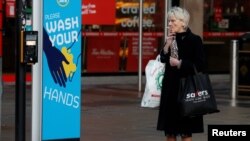Leading United Nations agencies are calling for urgent action to combat ageism, which they say harms the well-being of older people and national economies. The World Health Organization, Office of the High Commissioner for Human Rights, U.N. Department of Economic and Social Affairs and U.N. Population Fund have released the first global report on ageism.
A survey of more than 83,000 people in 57 countries finds 1 in every 2 people holds moderately or highly ageist attitudes. Those beliefs are based on stereotypical ideas about older people drummed into them at an early age.
Alana Officer is the World Health Organization’s unit head for demographic change and healthy aging. She says biases start early in life and are reinforced over time. She says ageism is pervasive -- in health care systems, in workplaces and in the media.
She says ageism leads to poorer physical and mental health and to a reduced quality of life for older people. Ageism, she says, determines who receives medical procedures and treatment and who does not. She says age discrimination denies older people jobs and job training.
“Half of the world’s population are ageist against older people, which rates much higher in low- and lower middle-income countries …The report indicates that you are likely to be ageist against older people if you are younger, you are male, you are fearful of dying or you are less educated," Officer said.
The report finds women are more likely to be targets of ageism than men. It says younger people also suffer from ageism across many areas, such as employment, health, housing and politics.
Vania de la Fuente-Nunez is technical officer in the WHO’s Demographic Change and Healthy Ageing Department. She says the COVID-19 pandemic has revealed how prevalent ageism is against both the young and the old.
“Older people have been systematically and homogenously framed as vulnerable and dependent and younger people have been stereotyped as invincible and selfish, which of course fails to recognize the great diversity that we see in both younger people and in older people," Fuente-Nunez said.
She says the stereotypical portrayal in the media is both inaccurate and harmful.
The report finds the economic cost of ageism is huge. A 2020 study in the United States shows ageism led to excess annual costs of $63 billion for a broad range of health conditions.
Another study in Australia suggests the national economy would be boosted by $37 billion annually if 5% more people aged 55 or older were employed.




